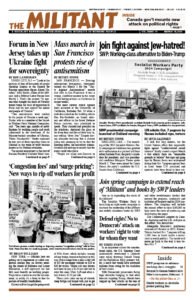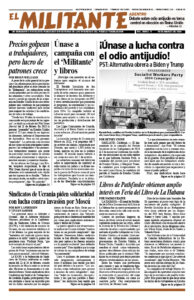ATHENS, Greece — Over 6,000 farmers and their supporters rallied outside the Greek parliament here Feb. 20. Working people lined the sidewalk clapping and raising clenched fists as nearly 200 tractors caravanned into the city center. The tractorcade was joined at the rally by 160 busloads of farmers from all over Greece.
Area trade unionists and university students showed up in solidarity. The students have been protesting government plans to allow private universities to open.
Farmers have for a month been using their tractors to block roads across the country. These actions come as farmers in Germany, France, Spain, Belgium and other European countries have mounted protests as well.
The government threatened to prevent tractors from entering the city, but in a victory for the right to protest, backed down in the face of the broad support the farmers got.
“Look, we small farmers can’t make ends meet. The cost of production is too high, and the prices paid for our commodities are too low,” Yannis, an apple farmer from the village of Zagora in Thessaly, told the Militant. “The middlemen make all the money. For example, we get 40 cents a kilogram for our apples, and you pay 2 euros [$2.18] for the same apples at the supermarket.
“I work on my farm, and also a construction job and as a lumberjack, just to pay bills,” he said. “In addition, last year’s floods in August were catastrophic and we haven’t been given a cent in state aid.”
Farmers who have set up roadblocks across the country addressed the rally. Like Yannis, many described the difference between the price they get paid for their crops and the prices on supermarket shelves.
Demands they submitted to the government included “special fuel prices for farm equipment, fuel that would be taxed at a much lower rate”; “reduction of electricity prices by about 30%”; “government subsidies for fertilizers, feed and other material”; and “protection of the Greek brand” from competition by foreign producers.
Some farmers joined calls for protection from farmers elsewhere. “Shut the borders and all will be OK. No more foreign stuff!” one shouted out to Militant reporters.
“The key problems are the cost of production and the new CAP,” Nikos Pavlanasios, president of the Panhellenic Union of Young Farmers, told the press, referring to the EU’s Common Agricultural Policy. The law is a series of “green” climate-change restrictions the EU imposes on farmers.
“Agriculture cannot exist with so many restrictions,” Pavlanasios said, pointing to the policy. “Do you see what is happening in other states? This is not just our problem.” Among other restrictions, the CAP requires farmers to set aside 4% of their land laying fallow, to protect the environment. The EU has made some concessions, but farmers said they are not sufficient.
The farmers parked their tractors in front of the parliament building overnight. The Hotel and Restaurant Workers Union provided free meals.
Bobbis Misailides and Natasha Terlexi contributed to this article.

